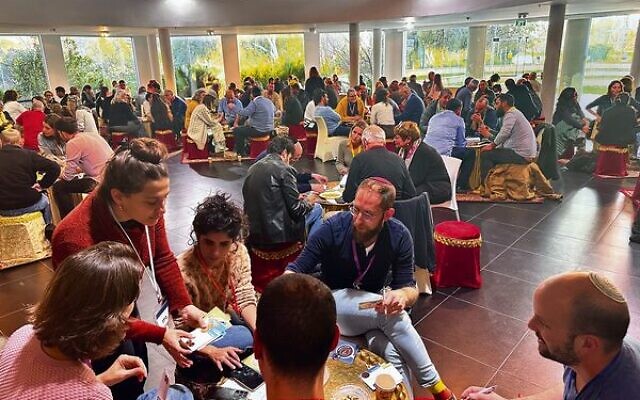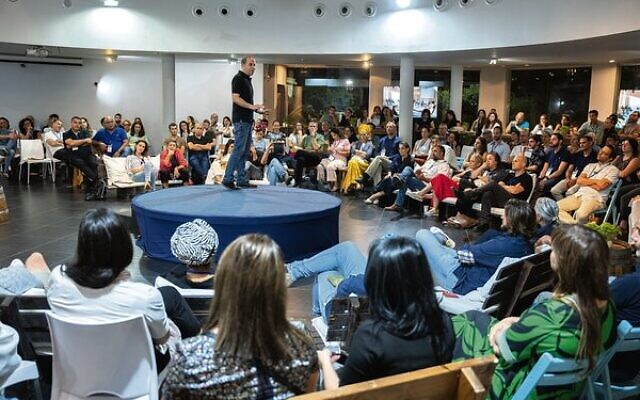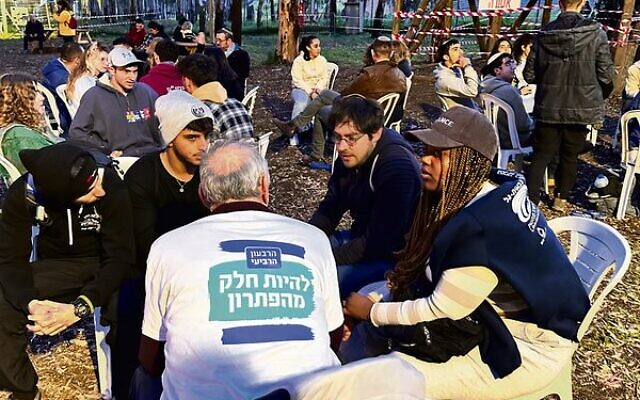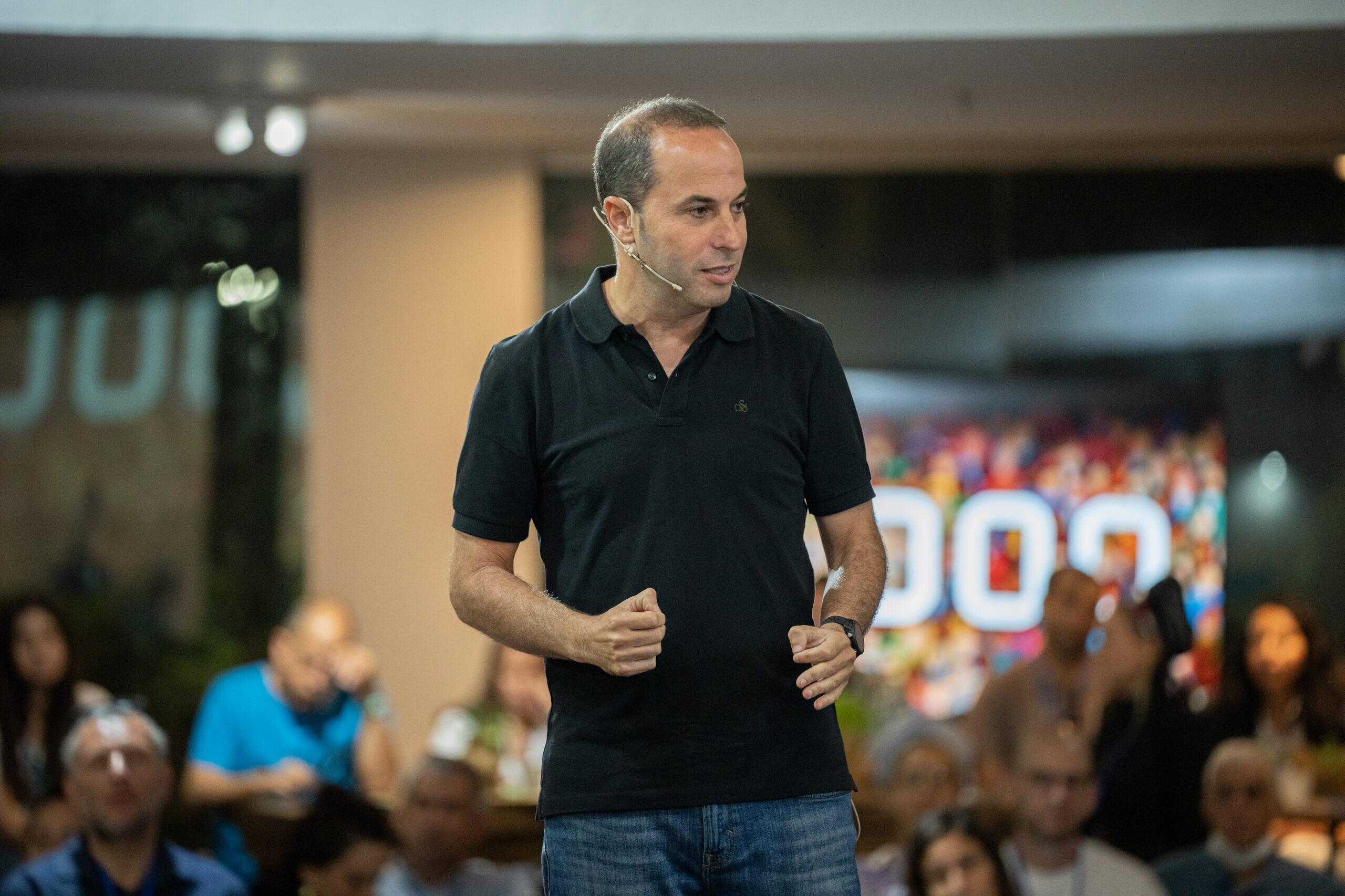If there’s one thing the distressing headlines from Israel won’t tell you, it’s that there are organisations working nonstop to fix the issues rocking Israeli society. One of them is The Fourth Quarter.
I spoke with its chairman Yoav Heller to discuss his organisation and this moment in Israeli history. A Major (res.) in the IDF, Yoav received a PhD in History from the University of London. He was part of the staff that established Ynet, Israel’s leading news site, and until 2021, was CEO of MAOZ, an organisation that works to strengthen Israel’s socio-economic resilience.
What is The Fourth Quarter?
The Fourth Quarter is a grassroots movement that aims to change the whole political system in Israel from what we describe as politics of zero-sum game to politics of trust building, or politics of hospitality. It was established a year and a half ago, during Prime Minister Bennett’s administration. We’re four people who came from different backgrounds — economics, history, security — and we believe Israeli society is nearing a level of polarisation that might actually threaten the mere existence of the state. We thought the dynamics of the political system in Israel brought us to a situation where we need to organise the moderates in Israel to change the dynamics of the system. We were four, now we’re 46,000.
You said Israel needs to change from a politics of zero-sum game into a politics of hospitality. What does that mean?
There are two angles for why we thought Israel is on the verge of a very dangerous situation. First, we need to understand the term “fourth quarter”. The fourth quarter is the first 75 to 100 years that a state experiences. We had Jewish sovereignty twice in the past, and both times it didn’t survive the fourth quarter. That was in King Solomon’s and the Hasmoneans’ days. We also saw that states around the world, including the United States of America, were on the verge of civil war, or in actual civil war in the fourth quarter of their existence. Usually, these states in the fourth quarter were in a battle between elites, and over what it means to be American, or what it means to be French, or Italian, or what it means to be Israeli.
The second angle is the collapse of trust in Western democracies. In the past 25 years, in most Western democracies there has been a decrease in trust between citizens and themselves, and citizens and institutions. Israel is not exempt.
The result of that collapse of trust and the fourth quarter phenomenon is polarisation. There are two kinds of polarisation: ideological and emotional. Ideological polarisation is: what is the difference between me and you when it comes to ideas? The more different we are, the greater the ideological polarisation. The less different we are, the smaller it is. Emotional polarisation is: what are the traits I attribute to you according to our political views? If Josh is liberal and I’m conservative, and if there’s large emotional polarisation, I’d say, “Josh is a traitor. He wants to destroy the State of Israel. He’s a liar”.
What’s interesting is that in Israel, in the past 30 years, ideological polarisation has not grown. On the contrary — it’s shrunk. But emotional polarisation has grown exponentially. That means Israelis are closer to one another in their worldview, but further from one another in their emotions towards one another.
The result is the rise of extreme politics, because in that environment, extreme politics tears us to the right and left, and causes the collapse of the centre. And when I say centre, I don’t mean a centrist party. Some parties could be more to the right, some could be more to the left, but there are core values and core stories that the centre holds, and that collapsed. That’s the politics of the zero-sum game. Moderates from the right and moderates from the left are captured because of the centre’s collapse. Moderates on the left are collaborating with the extreme left, moderates on the right are collaborating with the extreme right, and there is no — what we want to establish — big Israeli base that shifts from a politics of zero-sum game to a politics of hospitality.
There are four principles for this politics of hospitality. One is a politics of widespread agreement. Israelis do not want to compromise anymore, and a democracy cannot function without compromising.
Second is a politics of solutions, not victories. There is a mentality right now in Israel that if you win an election, the winner takes all. It’s not only in politics. It’s on the street, it’s in business. That’s a recipe for zealots to dictate our reality, and we’re saying no: We can fight with one another, but at the end of the day, our energy must go towards solutions, not victory.

Third is politics of humility. Whoever thinks the entire truth belongs to him, and there are no others who have any kind of truth — they are an extremist. We’re looking for politicians who understand that we are complementary opposites. I’m a better conservative if there’s a liberal arguing with me; I’m a better liberal if there’s a conservative arguing with me. There is no Jewish without democratic; there is no democratic without Jewish. There is no tradition without progress; there is no progress without tradition. Politics of humility means we need to understand that we complement one another, and it’s good that you hold a truth, but the fact that you hold a truth doesn’t mean the other truth is a lie.
Fourth is politics of the future. There’s a mentality in Israeli politics: let’s eat as much as we can today, because the next day we will be out of office, so we need everything right now. That’s a very big mistake, because we have huge problems for the future: security; the Israeli-Palestinian conflict; economics; integrating Haredim and Arabs into the workplace; our education system. At The Fourth Quarter, we’re calling for politics that foresees the future and doesn’t only look at tomorrow morning.
We want to organise one million Israelis by the summer of 2025 — which we think will be around the next election — to demand this kind of politics that we think will automatically lower emotional polarisation, and will create the ideas of the new Israeli centre, a camp of moderates.
You’ve previously said that Israel is in the best position it’s ever been, but is simultaneously at the most dangerous point in its history. Can you explain that?
First of all, I want to take credit for saying that a year and a half ago. [Yoav and The Fourth Quarter sounded the alarm before Israel’s current crisis began]. We talk to Israelis by going to salons all over Israel, telling our story to Israelis, and recruiting them to the movement. In the past year, I’ve done 210 salons. In the salons, I tell people the situation is confusing. If you look at Israel’s military condition, Israel’s economic condition — at least until a few months ago — and Israel’s human resources, it’s a source of pride and hope, because we have one of the best armies in the world, we have a very strong economy, and we have great human resources in Israel. But on the other hand, we are in the most dangerous place we have ever been, because social polarisation has trickled from parliament, to the streets, to families, to the army, to the health care system, and we’re losing the secret sauce that made us so great: our ability to work together to solve problems through debate, because at the end of the day we had a mutual vision.
If you look back at history, when both Jewish states collapsed, it was in an era of abundance, not scarcity. Usually nation states are built out of scarcity. If they’re successful, in the era of abundance — usually at the end of the third quarter, towards the fourth quarter — people start asking themselves, “Okay, we’re good. Now, what sticks us here to one another?” That’s the dichotomy between our best and worst ever position.
You said Israelis are losing the secret sauce holding them together. I’ve seen you argue that in response to this, Israelis need to create a new Israeli story. What does this new Israeli story look like?
This story needs three anchors. One is Jewish and democratic. Israel is a Jewish state, and we don’t need to apologise for that. We’ve dreamt about this state for thousands of years, and the Jewish people have something to tell the world about how to run a state. This needs to be part of our DNA. Complementary to that, it has to be a liberal democracy. Israel has to be the Jewish homeland, but it also has to accept that there are minorities here, and there are different opinions here. The only way the Jewish state can survive is by combining them both.
The second anchor is the combination of tradition and progress, or the past and future. We need to respect and understand that our Jewish tradition — and there are populations in Israel who hold Jewish tradition more dearly than others — is a part of the ground we stand on. On the other hand, we need to understand that there will be no tradition, there will be no connection to the past, without our motivation to be first in everything in the new world: technology, economics, philosophy.
The third anchor is the combination of individual sovereignty and the autonomy of the community, but, complementary to that, has to be the common good. Israel has to accept that there is no more melting pot here. That’s over. We’re too different. Some sense of autonomy will have to be given to the different communities in Israel, but on the other hand, everybody will need to contribute to the mutual responsibility to the State of Israel’s existence, prosperity, and so on.

I want to dig deeper into this melting pot issue, which lines up with one of your core theories, that Israel’s first “revolution generation” cleared the way and built the state’s foundations. The second generation laid the scaffolding, and the third generation — still feeding off the energy of the first generation’s ideas — expanded the state’s power and capabilities. Then came the fourth generation, including those who felt sidelined by earlier generations, and they demanded their fair share of the winnings. How is this playing out in Israel?
Let’s go back to the fourth quarter and the battle of elites. One elite is more Ashkenazi and Western. They were very dominant during Israel’s establishment, and they have an objective and subjective view of reality. Their objective view of reality is that how they envisioned the State of Israel is being challenged, and their mere existence is being threatened. Then comes their subjective view of reality, which says, hence, “I’m disproportionately weak, I’m only a victim, and I can’t do anything besides fighting the others”. This is subjective, because this elite has really big resources in the economy, academia, the judicial system, and special units in the army.
Then come the new elites [Mizrahim, Likud supporters, Haredim, Israelis from the periphery] who also have objective and subjective views of reality. Objectively, they’re saying, “Hello, we’re here. You better share your social, economic, and political capital with us. If not, we’ll take it by force”. They’re right: they’re not fully represented in Israeli society. You can see it in special units, in academia, in legislation. Where comes the subjective part? They’re saying, hence, “We’re weak. We’re victims. Our hands are tied”. Of course that’s subjective, because these new elites have been governing for almost 40 years, which means a lot of power, resources, and appointments — the unions almost completely belong to them.
So what do we get here? We get a lethal combination where all Israelis are saying, “I’m losing. I’m a victim. I will not take responsibility”. Everybody tells me they support unity, so I say that’s not interesting — I want to know what you’re willing to give up for unity. They tell me, “No. I stopped sacrificing. Now it’s their turn to give up something”. Nobody is willing to sacrifice anything, because everybody feels they’re losing. So who’s going to take responsibility for Israel’s future?
That’s why we want a new Israeli base of moderates who’ll say, “Okay, I understand. I need to sacrifice something, because I will not get 100 percent. I will get 60 to 70 percent; you will get 60 to 70 percent”. In fact, 60 to 70 percent of Israeli society thinks like that, and we’re going to organise ourselves and say, “Extremists, okay, you don’t want to give up anything? That’s okay. But you cannot be at the centre of Israeli politics and decision making, because you’re killing us”.

You speak to Israelis of all political, religious and ethnic stripes. Are there any other similarities between these groups that have stood out in your discussions with them?
Fear. Everybody is very fearful of what their place is going to be in the future of Israel. Arab society is very fearful and a bit overwhelmed by what’s going on and where its place is in this battle.
But I do see another sentiment. Almost everywhere I go, except for the extremists, people are looking for hope. People are looking for a path, for how, on the other side of the tunnel, we can create a future here and celebrate, for the first time in our history, 100 years of the State of Israel.
I think this combination of fear and the desire for hope is one of our keys to success. If we start working right now — not the day after — in order to create bridges for the day after, there is hope, because we are complementary opposites. We always have been — we just need to redefine our mission and our story. We need a new social contract. This is actually good news, what’s happening right now, because everybody understands it. We just need to be very, very careful over the next few weeks and months regarding the temperature here, because it’s already dangerous, and it could rise to a level where it becomes much more dangerous.
Going off what you just said, is it fair to say you’re optimistic about Israel’s future?
I’ll use Rabbi Sacks’ (ז״ל) definition of optimism versus hope. Rabbi Sacks said optimism is wishful thinking. He said, sometimes I see reality and I’m optimistic, and sometimes I’m a pessimist. But hope is actually being proactive to create a reality you believe in. Right now, a lot of Israelis are very proactive in trying to create the reality they want. They’re trying to say they want to be stakeholders in the State of Israel’s future. So I’m very hopeful. I’m not sure I’m that optimistic these days, but I’m very, very hopeful.
Is there anything else you want to add?
People ask me about the Jewish diaspora’s place in what’s going on right now in Israel. The traditional way of thought for most Jews in the diaspora and Israelis in Israel is that this is an internal Israeli affair, but I think this is a misreading of what’s going on in Israel.
Let me give you interesting data. In 30 to 50 years, demographics show that for the first time in thousands of years, there will be more Jews in Israel than in the rest of the world. This means that the responsibility of the State of Israel and the diaspora for the existence of the Jewish people — not only the Jewish state — rises to a new level. I think a lot of what is going on right now in Israel will affect the definition of who is Jewish, what the relationship is between Israel and the diaspora, and what “the Jewish world” means.
I don’t think the diaspora can sit aside and just say this is an internal Israeli affair. No, this is also a Jewish peoplehood affair. You can have your opinion, that’s okay. But have the debates, have the discussions. Talk to Israelis. Get involved. Speak up, because this is the future of the Jewish people.
Josh Feldman is a Melbourne-based writer
@joshrfeldman


comments